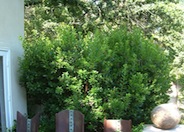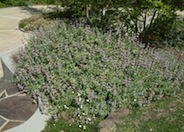Pest Management
Are pests bugging you? If pests are taking over there might be a good reason! Instead of grabbing that bottle of spray, consider using techniques that can solve your pest problems without toxic pesticides.
Click in the green box for more information

Common name:Howard McMinn Manzanita
Botanical name:Arctostaphylos densiflora 'Howard McMinn
This shrub is highly appreciated for its decorative characteristics, which include a dense show of small, pale pink urn-shaped flowers. Above all, it is the mahogany-red to brown bark (which peels beautifully) that is the major attraction. Its fruit resembles the tike apple, and the flowers contrast perfectly to the light green leaf (which can get rather tough). It blooms from late winter to spring. - Cornflower Farms

Common name:Italian Buckthorn
Botanical name:Rhamnus alaternus
This large shrub will grow to 25' tall and has small, dark green leaves.

Common name:European Grey Sedge
Botanical name:Carex divulsa
Berkeley Sedge is a fast growing, vibrant green clumping sedge to 2' tall and wide. Widely adaptable, it can be planted in wet soil or arid soil, tolerates sun to partial shade and can be drought tolerant. Tan to brown flowers show in spring.
Dry creek bed

Common name:Cleveland Blue Sage
Botanical name:Salvia clevelandii
The Cleveland Sage is a perennial shrub that grows 4' tall and wide. It has fragrant gray foliage and blue flowers that bloom between May and August. This shrub needs full sun and prefers well drained soil. The Cleveland Sage is native to California and is drought tolerant. -Cornflower Farms

Common name:Point Sal Spreader Purple Sage
Botanical name:Salvia leucophylla 'Point Sal Spreader'
The Point Sal Spreader Sage is an evergreen shrub that grows 3'-4' tall and 4'-6' wide. It has gray green to white leaves. Flowers are pinkish purple. This shrub tolerates heat and droughts. This Salvia is a California native. This variety has a more prostrate form than other varieties.
| Designer: Various | Rainwater Gardens D2 |
Photographer: GardenSoft |
Soils and Compost:
Incorporate compost 6" into your soil to retain water, reduce compaction, feed earthworms, and provide valuable nutrients to your plants.
Water Saving Tip:
Adjust sprinklers to avoid watering sidewalks and driveways.
Integrated Pest Management:
Drip and other smart irrigation delivers water directly to roots, allowing no excess water for weeds.
